The Social Innovation in Health Initiative (SIHI) is expanding its reach through new case studies in Central America and the Caribbean, and embedding the principles into ongoing programmes and courses.
The TDR-initiated network of individuals and institutions works to advance social innovation in health in developing countries. SIHI partners conduct research on community-based social innovation models and develop tools/ mechanisms to strengthen research; partner with research institutions in low- and middle-income countries to advance social innovation capacity; and share best-practice learning and engage strategic influencers to further the adoption and scale of social innovation.
Three new case studies selected in Central America and the Caribbean
A telemedicine initiative in the Gracias a Dios department in Honduras and two programmes to control Chagas disease in Comapa, Guatemala, received SIHI recognition for their innovative approach and community to improve the health of their populations.
The three experiences were selected from a list of 12 applications that were presented to a call made by the Pan American Health Organization (PAHO), the International Center for Training and Medical Research (CIDEIM) and the ICESI University of Colombia, and TDR. The goal was to identify initiatives that would present solutions and community responses to infectious disease problems.
MosquitiaMed: Shortening distances through telemedicine in Honduras
This programme seeks to reduce the impact that the costs of health services generate on the family and community economy. The initiative is volunteer based, with a focus on telehealth to improve access to health services for the Miskitos community. In this region, there is only one hospital in the capital (Puerto Lempira) and usually one doctor per shift, so a group of doctors created MosquitiaMed. | 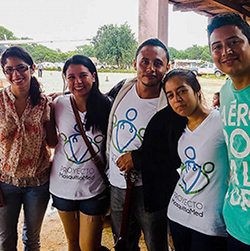 |
Community-based participatory strategies in Guatemala to prevent Chagas and Zika in rural areas
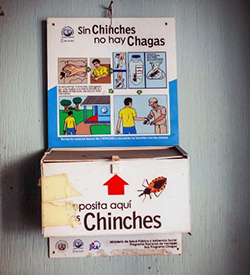 | By bringing together communities with the municipality in charge of vector control and the Comapa Health Centre, stronger prevention programmes are being put in place. Reinfestation of the vector that transmits Chagas disease into homes is being reduced. The bugs live and nest in the farm animals living around the house property, so communities are provided with educational tools to prevent infestation in the home. The initiative also improves the diagnosis and care of patients with Chagas disease at the Comapa Health Center. It has worked to reduce mother-to-child transmission of the disease using a strategy that could be applied to preventing Zika virus. |
Ecohealth approach in Guatemala to control native vectors of Chagas disease
In Comapa, Guatemala, risk factors that led to the infestation of houses with the vector that transmits Chagas disease were identified. Three of these factors were linked to the quality of the floors and walls of the houses, and the presence of animals inside the house. This information was used by the community to identify the best way to fill the cracks where these vectors can be housed, using local materials with culturally appropriate techniques. Awareness about the health risks of this disease was raised, and community leaders were trained in how to improve their houses and implement healthy measures for the management of their animals. This approach has since been replicated in other countries of Central America. | 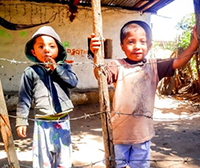 |
Embedding social innovation in SIHI partners’ programmes
Diagnostics course
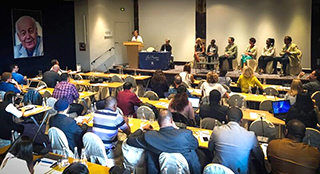 | For the first time, social innovation was embedded in an ongoing diagnostics course sponsored by the London School of Hygiene & Tropical Medicine and Fondation Merieux. At its 9th course held in September in Annecy, France, participants learned more about the concept and how to consider it for their work in diagnostics. TDR Director John Reeder chaired a panel on social innovation and its role in universal health coverage and universal diagnosis. Panellists included SIHI members and staff from the World Health Organization’s service delivery and safety department. |
More information on the 9th Advanced Course on Diagnostics
First forum bringing technological and social innovation together
Ahimsa Fund, a SIHI partner, hosted a new event in October in Annecy, France, to explore synergies among technology and social innovations for health care delivery. Eighty participants representing 31 different countries, and from various fields such as humanitarian, academic, business, government, and industries from low-, middle- and high-income countries discussed the issues from their multiple perspectives. | 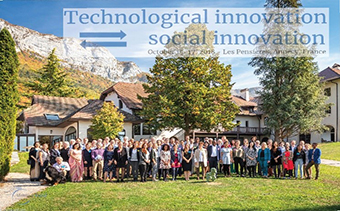 |
Jean-Francois de Lavison, the founder of Ahimsa Fund, explained how he views global health as a puzzle where each actor can help put a piece together. Panel sessions highlighted the diversity of cultural and societal elements for making an innovation successful and sustainable.
Ten innovation projects were selected and discussed in groups during dream-storming sessions. The consultations during the group work helped innovators shape their ideas designed for better health coverage among the most vulnerable.

